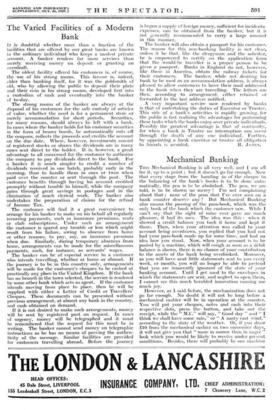The Varied Facilities of a Modern Bank
IT is doubtful whether more than a fraction of the facilities that are offered by our great banks are known to the ordinary individual who keeps a modest private account. A banker renders far more services than merely receiving money on deposit or granting an overdraft.
The oldest facility offered his customers is, of course, the use of his strong rooms. This favour is, indeed, older than banking itself, for it was the goldsmith of old, who by allowing the public to deposit their plate and their coin in his strong rooms, developed first into a custodian of cash and eventually into the banker of to-day.
The strong rooms of the banker are always at the disposal of his customers for the safe custody of articles of value, whether the need is for a permanent store or merely accommodation for short periods. Securities, for many reasons, should always be left with a bank. In cases where the banker holds for his customer securities in the form of bearer bonds, he automatically cuts off the coupons, collects the proceeds and credits the account on the due date. Where, however, investments consist of registered stocks or shares the dividends are in many cases sent direct to the holder. It is, however, a great advantage to all concerned for the customer to authorize the company to pay dividends direct to the bank. For a banker it is much simpler to credit a number of dividends received in one batch, probably early in the morning, than to handle them in ones or twos when paid over the counter or sent through the post. The customer benefits through having his account credited promptly without trouble to himself, while the company gains through great savings in postages and in the elimination of much clerical work. The banker also undertakes the preparation of claims for the refund of Income Tax.
The customer will find it a great convenience to arrange for his banker to make on his behalf all regularly recurring payments, such as insurance premiums, rents or club subscriptions. Under such an arrangement the customer is spared, any trouble or loss which might result from his failure, owing to absence from home or other reasons, to pay, say, an insurance premium when due. Similarly, during temporary absences from home, arrangements can be made for the miscellaneous payments, such, for instance, as servants' wages. The banker can be of especial service to a customer who intends travelling, whether at home or abroad. If the journey is to be in this country only, arrangements will be made for the customer's cheques to be cashed at practically any place in the United Kingdom. If the bank has no branch in the town selected, the service is rendered by some other bank which acts as agent. If the customer intends moving from place to place, then he will be supplied with either a Letter of Credit or Travellers' Cheques. These documents' can be presented without previous arrangement, at almost any bank in the country, and cash obtained on demand.
If it is not desired to make such arrangements, money will be sent by registered post on request. In cases of urgency, money will be telegraphed and it must be remembered that the request for this must be in writing. The banker cannot send money on telegraphic instructions as he has no means of proving the authen- ticity of the message. Similar facilities are provided for customers travelling abroad. Before the journey is begun a supply of foreign money, sufficient for incidenta expenses, can be obtained from the banker, but it il not generally recommended to carry a large amount in this manner.
The banker will also obtain a passport for his customer. The reason for this non-banking facility is not clear, unless it be that, like the clergyman and the solicitor, he is empowered to certify on the .application form that the would-be traveller is a proper person to be given a passport. Banks in England do not, however, like those in America, obtain the railway tickets for their customers. The •banker; while not desiring his bank to be used as an accommodation address, is always pleased to allow customers to have their mail addressed to the bank when they are travelling. The letters are then,. according to arrangement, either retained or forwarded to the last address notified. - . A very important service now rendered by banks is that of undertaking the duties of Executor or Trustee. This side of a bank's activities is rapidly growing, for the public is fast realizing the advantages for performing these tasks which thehanks enjoy over private individuals. Possibly the greatest advantage is that of continuity, for when a bank is Trustee no interruption can occur through the death of any one individual. Further, by appointing a bank executor or trustee all obligation to friends is avoided. R. JAMES,


















































 Previous page
Previous page